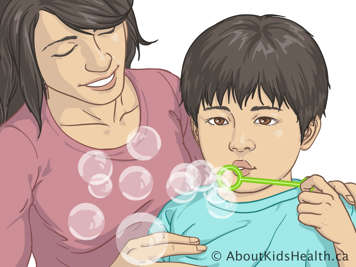What is blood work?
Most children will need blood work at some time. When a child is sick, or as part of ongoing treatment, their blood may need to be looked at in a lab. This is called blood work. To get the blood, a nurse or someone else at the hospital will put a needle into one of the child's veins.
You can prepare your child for blood work by letting them know what to expect
Usually, it is best to tell your child ahead of time that they are going to have blood work. When a child knows what to expect, they will probably feel less worried about what will happen. Some parents believe that if they tell their child too far ahead of time, the child will worry too much. For most children, it is a good idea to tell them a day or two before they go to the hospital.
What parents can do to help
What you can do to help your child prepare for blood work depends on how old your child is. What helps a very young child is often different from what helps an older child.
Your reaction to a stressful situation can influence your child's reaction. For example, if you show that you are worried about your child getting a needle, your child may become more worried. If you are relaxed about your child getting a needle, your child may feel more relaxed.
Distracting your child is helpful
Distraction is usually helpful for any child. The best way to distract a child during a needle depends on the child's age.

Toddlers 12 months to 2 years old
Distract your toddler with bubbles or toys that move and make noise. Pinwheels, magic wands, and light-up toys work well.
Children 3 to 5 years old
Bring your child's favourite toy to the hospital. They can hold the toy while blood is being taken. Bubbles and toys that make light and sound may also help.
Children 6 to 12 years old
Toys that light up and make noise may still help if your child is this age. Video games, "search and find" books, and favourite stuffed animals and other toys from home can also help.
Blowing bubbles can also distract an older child. The deep breathing while blowing bubbles can help her relax.
Some older children can use their imaginations to distract them. Get your child to close her eyes and imagine a favourite place or activity. You can also tell them jokes or stories. If your child is a teenager, stories, jokes and imagination games can help distract them as well.
What parents can say to help
The words you use to tell your child what is going to happen are important. Use words that will reassure them. Let them know what is going to happen in words they can understand. Talk to them about what they will see, feel, hear and smell. To help your child understand how long it takes to give blood, say "getting the needle is faster than a commercial on TV."
Here is a way to explain what will happen:
- Before the needle, a big rubber band that feels like a balloon will be wrapped around your child's arm. Tell them that the band will feel tight like someone is squeezing their arm.
- The nurse will clean a small patch of skin on your child's arm and this will feel cold.
- The needle will be put into the arm and blood will go into the needle. Your child will feel a pinch or prick that can sting or hurt a little, or they may feel nothing at all.
- Once the blood is taken, the needle comes out and a small bandage is put on the spot where the needle was.
Other helpful hints
- Tell your child why they are having blood taken.
- It can be helpful to show children toy needles and other medical equipment before blood is taken. Some hospitals have these toys. When children see and play with these toys, it can help them feel less worried when they see real needles.
- Children feel better when they have some control. You can help your child feel they have control by giving them choices. For example, ask them what they would like to take to the hospital. You can also ask if they would like to play with a toy or hear a favourite story while blood is taken.
- Let your child know that it is okay not to like what is happening. It is good to let your child express how they feel. It is also a good idea to tell your child that her "most important job" is to stay still while they get the needle.
- Some children worry that they will not have enough blood after some has been taken from their arm. You can tell your child that only a very small amount of blood is taken. You can also tell them that their body makes new blood all the time.
